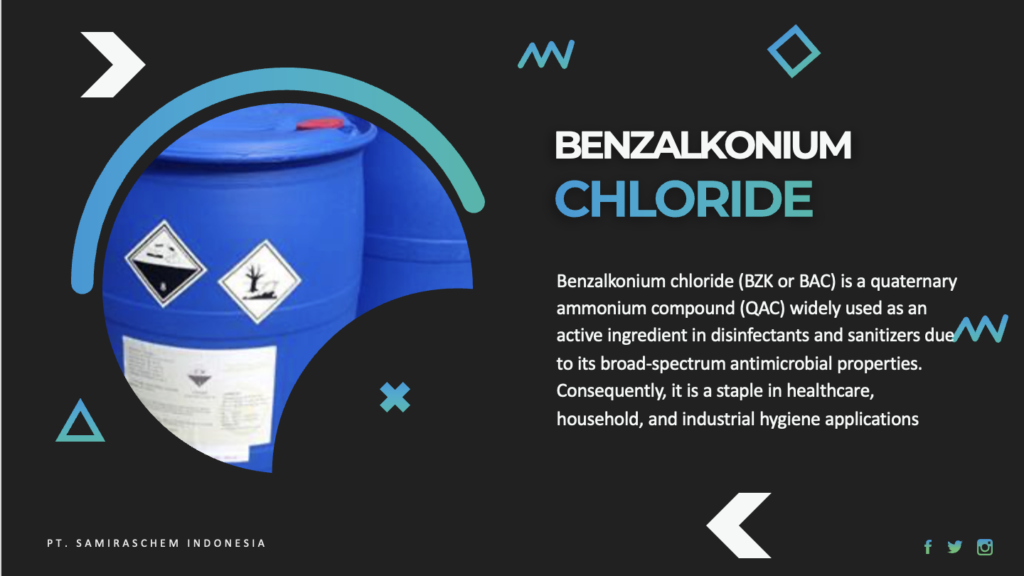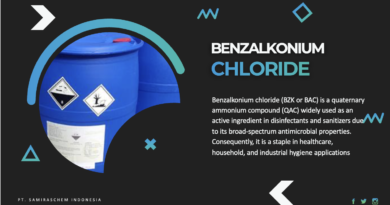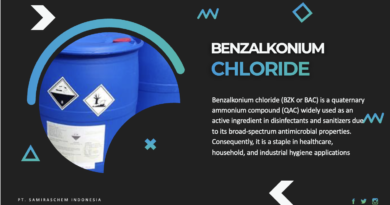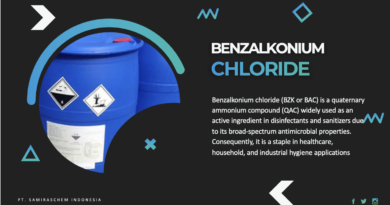Supplier Benzalkonium Chloride
Benzalkonium chloride (BZK or BAC) is a quaternary ammonium compound (QAC) widely used as an active ingredient in disinfectants and sanitizers due to its broad-spectrum antimicrobial properties. Consequently, it is a staple in healthcare, household, and industrial hygiene applications. Its efficacy, safety, and versatility make it a preferred choice in a variety of settings. Leading supplier benzalkonium chloride often ensure high-quality formulations to meet the demands of these diverse applications.
Supplier Benzalkonium Chloride in Disinfectants and Sanitizers
Benzalkonium chloride refers to a mixture of alkylbenzyl dimethylammonium chlorides, where the alkyl chain length typically ranges between C12 and C18. The general formula for benzalkonium chloride is:
The chain length significantly influences its antimicrobial activity, solubility, and interactions with microorganisms. For example, longer alkyl chains tend to have higher antimicrobial efficacy but may pose solubility challenges.
Mechanism of Action
Benzalkonium chloride is a cationic surfactant with a unique mechanism of antimicrobial action:
-
- Interaction with Cell Membranes:
- First, BZK’s positive charge allows it to bind to negatively charged microbial cell membranes.
- This interaction disrupts the lipid bilayer, compromising membrane integrity.
- Protein Denaturation:
- Next, the compound denatures intracellular and membrane-bound proteins, leading to the inhibition of vital processes.
- Cytoplasmic Leakage:
- As a result, membrane disruption results in leakage of essential cytoplasmic contents, causing microbial death.
- Oxidative Stress:
- Additionally, BZK may induce oxidative stress, further damaging microbial cells.
- Interaction with Cell Membranes:
This mode of action is effective against a broad range of microorganisms, including:
-
- Bacteria: More effective against Gram-positive than Gram-negative bacteria due to differences in cell wall structure.
- Fungi: Effective against yeasts and molds.
- Enveloped Viruses: Potent against viruses with lipid envelopes, such as coronaviruses and influenza viruses.
Applications in Disinfectants and Sanitizers
Benzalkonium chloride broad-spectrum efficacy and versatility have led to its incorporation in various products and industries. Reliable suppliers of benzalkonium chloride play a critical role in ensuring its availability for these applications.
-
- Surface Disinfectants:
- Firstly, it is used in sprays, wipes, and cleaning solutions for disinfecting surfaces in healthcare facilities, food processing units, and households.
- Furthermore, it provides residual antimicrobial activity, which helps prevent microbial regrowth after application.
- Hand Sanitizers:
- It is also an alternative to alcohol-based hand sanitizers.
- In particular, it is gentler on the skin, reducing dryness and irritation.
- Medical and Veterinary Applications:
- In medical settings, it is found in skin antiseptics, surgical scrubs, and wound cleansing solutions.
- Moreover, it is often used in veterinary practices for disinfecting surgical instruments and maintaining hygiene.
- Agricultural and Industrial Uses:
- In addition, it is incorporated into sanitizing solutions for equipment, surfaces, and water systems in agriculture and food production.
- It is also used for algae control in water treatment systems.
- Personal Care Products:
- Furthermore, it is found in cosmetics, shampoos, and other personal care products as a preservative and antimicrobial agent.
- Surface Disinfectants:
Supplier benzalkonium chloride work closely with manufacturers to ensure consistent quality and availability across these diverse uses.
Advantages of Benzalkonium Chloride
-
- Broad-Spectrum Antimicrobial Efficacy:
- To begin with, it is effective against a wide range of microorganisms, including bacteria, fungi, and enveloped viruses.
- Residual Activity:
- Another key advantage is that it leaves a protective antimicrobial layer on treated surfaces, offering prolonged protection.
- Skin-Friendly:
- Additionally, it is less likely to cause skin dryness and irritation compared to alcohol-based products.
- Non-Flammable:
- Importantly, it is safer for transportation and storage compared to alcohol-based alternatives.
- Stable and Versatile:
- Moreover, it retains efficacy across a wide range of pH levels and temperatures.
- It is also compatible with various formulations, including wipes, gels, and liquids.
- Cost-Effective:
- Lastly, it is economical for large-scale use in industries and healthcare facilities.
- Broad-Spectrum Antimicrobial Efficacy:
Limitations and Challenges
While benzalkonium chloride offers numerous benefits, it also has certain limitations:
-
- Limited Efficacy Against Certain Microorganisms:
- For instance, it is less effective against non-enveloped viruses and bacterial spores compared to alcohol or bleach-based disinfectants.
- Resistance Development:
- Prolonged or improper use can lead to microbial resistance.
- In fact, cross-resistance with antibiotics has been reported in some cases.
- Sensitivity to Organic Matter:
- Its efficacy decreases in the presence of organic materials like blood, soil, or grease.
- Environmental Concerns:
- Additionally, it is persistent in aquatic environments and potentially toxic to aquatic organisms.
- Proper disposal is therefore required to minimize environmental impact.
- Regulatory Scrutiny:
- Furthermore, it is subject to strict regulations regarding concentration and application to ensure safety and efficacy.
- Supplier benzalkonium chloride often focus on optimizing chain length for specific applications to enhance its effectiveness.
- Limited Efficacy Against Certain Microorganisms:
Safety and Handling
-
- Human Safety:
- Generally, it is considered safe for use in low concentrations (≤0.1%) in personal care and household products.
- However, higher concentrations can cause skin and eye irritation.
- Environmental Safety:
- It is persistent in water bodies and potentially harmful to aquatic life.
- Therefore, biodegradation is slow, necessitating careful disposal practices.
- Storage and Handling:
- It should be stored in a cool, dry place away from oxidizing agents and acids.
- Furthermore, personal protective equipment (PPE) should be used when handling concentrated solutions.
- Human Safety:
Regulations and Standards
Benzalkonium chloride to regulate by various global authorities to ensure safe and effective use:
-
- United States:
- Approved by the FDA as an active ingredient in antiseptic hand rubs and by the EPA for surface disinfectants.
- European Union:
- Included in the EU Biocidal Products Regulation (BPR) for specific applications.
- Asia-Pacific:
- Approved by regulatory bodies in countries like Japan, China, and India for use in sanitizers and disinfectants.
- World Health Organization (WHO):
- Additionally, it recognizes quaternary ammonium compounds, including BZK, as effective disinfectants for certain pathogens.
- United States:
Supplier benzalkonium chloride must comply with these regulatory frameworks to ensure their products meet global safety and efficacy standards.
Formulation Considerations
When formulating products with benzalkonium chloride, the following factors are critical:
-
- Concentration:
- Typical concentrations range from 0.05% to 0.1% for sanitizers and 0.5% to 2% for surface disinfectants.
- pH Stability:
- It is stable across a broad pH range (4 to 10), but efficacy may vary.
- Compatibility:
- It is compatible with non-ionic and amphoteric surfactants but may interact negatively with anionic surfactants.
- Formulation Additives:
- Incorporating humectants and emollients in hand sanitizers enhances skin compatibility.
- Chelating agents like EDTA to improve antimicrobial efficacy by binding divalent cations.
- Concentration:
Supplier benzalkonium chloride often provide technical guidance to manufacturers to ensure optimal formulation and application.
Efficacy Comparisons
Benzalkonium chloride often compare to other disinfectant agents:
-
- Alcohol-Based Sanitizers:
- On one hand, these are faster acting but lack residual activity.
- On the other hand, they can cause skin dryness with repeated use.
- Chlorine-Based Disinfectants (e.g., Bleach):
- Similarly, these are effective against a broader spectrum, including spores.
- However, they are corrosive and less skin-friendly.
- Hydrogen Peroxide:
- Effective but less stable and more expensive.
- Alcohol-Based Sanitizers:
PT. Samiraschem Indonesia is Reliable Supplier Benzalkonium Chloride with High Quality Product and Good Price. We are Serving and Delivered Area such Jakarta Bandung Semarang Jogja Surabaya Medan and Batam
Future Trends and Innovations
-
- Enhanced Formulations:
- Researchers are developing synergistic blends with other antimicrobial agents to improve efficacy.
- Eco-Friendly Alternatives:
- There is growing interest in biodegradable QACs to address environmental concerns.
- Sustainability in Supply:
- Suppliers of benzalkonium chloride are increasingly focusing on sustainable production practices to align with global environmental goals.
- Enhanced Formulations:



